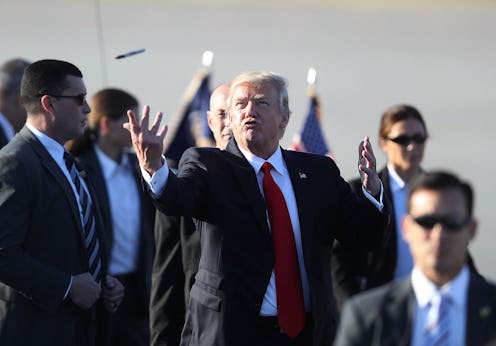
On Tuesday evening, Rachel Maddow revealed a partial copy of Donald Trump's 2005 tax return on her show. The return is garnering a lot of attention because Trump has famously refused to adhere to presidential precedent and release his own returns. However, while certainly intriguing, the release of Trump's 2005 tax documents still leaves many questions unanswered, particularly about the sources of the president's income.
The 2005 tax return revealed by Maddow consisted of part (two pages) of the complete return and showed that Trump and his wife, Melania, paid $38 million in federal taxes and made around $150 million in income in 2005. However, what the partial copy of the tax return did not show was any information about from where Trump derives his income.
As Vox reports, it is tradition that American presidents release their tax returns in order to acquire a complete picture of with whom the president has exchanged money and engaged in business. This is important because it identifies potential conflicts of interest (i.e. potential business dealings with individuals with close ties to criminality or oppositional foreign governments) and also helps ensure that the president is not being paid for governmental favors. Essentially, tax returns are supposed to reveal a president's financial relationships and identify any possible sources of leverage that could be used to influence him or her.
The release of Trump's 2005 tax returns accomplishes none of these tasks. Without a complete tax return revealing sources of income and without a full, comprehensive set of tax returns spanning many years, Americans know very little about Trump's financial relationships.
This lack of information about Trump's sources of income is particularly alarming in light of Trump's refusal to fully divest from his international business empire, in which he maintains a significant financial stake. According to Vanity Fair, Trump's refusal to fully divest coupled with his adamant refusal to release any of his tax returns does nothing to quell concerns that the president may not be making decisions objectively.
Thus, while Maddow's reveal of Trump's 2005 tax returns is intriguing both because Americans have seen so little of the president's tax information thus far and because it reveals that he paid taxes at the same rate as a middle-class family despite his millions in income, it does little to assuage concerns about the state of Trump's financial and business relationships. The only thing that would help mitigate these concerns and quell suspicions is a full release of years of Trump's tax returns that identify sources of income. However, as Vox points out, the fact that Trump refuses to release any of this information, even in light of the recent leak, means that "whatever is in his returns is [probably] not great."
Now more than ever, the onus is on Trump to release the rest of his tax information and provide full disclosure to the American people. The leak of a partial 2005 tax return is not nearly enough to address the many questions surrounding Trump's financial engagements.